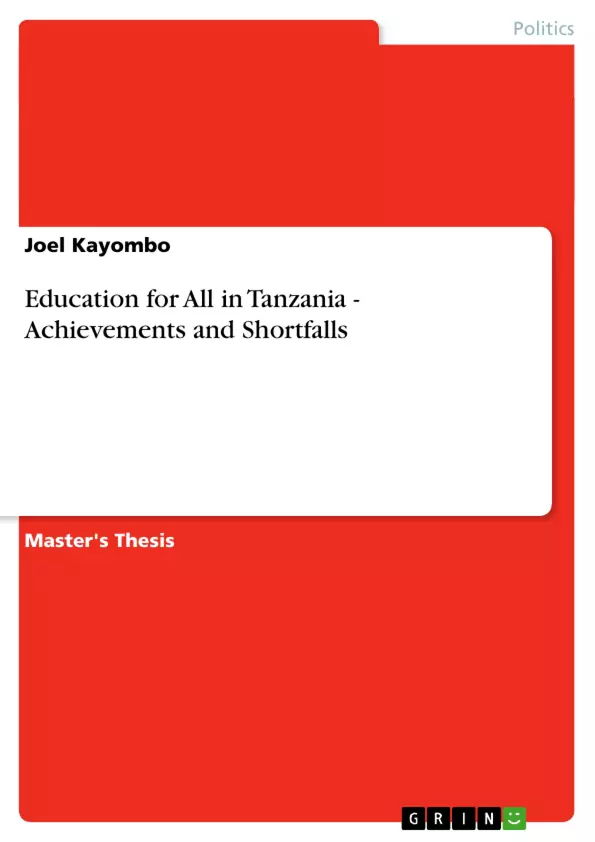Meeting basic learning needs of all children, youths and adults is the ultimate target of most of the international and national communities as well as governments across the world. Tanzania, like all other UNESCO member states, has committed to EFA goals defined in the Dakar Declaration on Education for All and the Framework for Action.
This study focused on reviewing the achievements made and shortfalls encountered by Tanzania (Mainland) towards attaining the six EFA goals since the on-set of the new millennium. The study made use of documentary sources in which the researcher systematically and objectively researched evidences relevant to the study question. The analysis of the six EFA goals were categorized into three major themes namely early childhood care and education, universal primary education and gender and learning programmes for life skills and literacy. The categorization of these themes was based on the fact that quality (EFA goal 6) cuts across all EFA goals.
The results indicated that the country has attained momentous progress in universalizing primary education, closing the gender gap and meeting the learning needs of youth and adults through non-formal delivery modes. On the other hand, it has made little progress in providing comprehensive early childhood care and education.
The study further identified critical shortfalls facing the implementation of the EFA goals in the country. Among the major shortfalls are ensuring comprehensive early childhood care and education, quality education, education equity, learning programmes for disadvantaged population groups, provision of relevant literacy and life skills and management of the EFA statistics. This indicates that, still there is a long way to go in order to fully meet the learning needs of all children, youths and adults. Finally, the study recommends the country to undertake broad reflection on policies and practices to make the EFA goals viable.
Inhaltsverzeichnis (Table of Contents)
- Abstract
- Chapter One: Introduction
- Background to the Study
- Statement of the Problem
- Objectives of the Study
- Research Questions
- Significance of the Study
- Scope and Delimitation of the Study
- Operational Definitions
- Chapter Two: Literature Review
- Conceptual Framework of Education for All (EFA)
- The Dakar Framework for Action
- Tanzania's EFA Policy and Programmes
- Key Issues and Challenges in EFA Implementation
- Review of Related Studies
- Chapter Three: Research Methodology
- Research Design
- Research Population and Sample
- Data Collection Methods
- Data Analysis Methods
- Ethical Considerations
- Chapter Four: Data Presentation and Analysis
- Early Childhood Care and Education
- Universal Primary Education
- Gender and Learning Programmes for Life Skills and Literacy
- Chapter Five: Discussion of Findings
- Chapter Six: Summary, Conclusions and Recommendations
Zielsetzung und Themenschwerpunkte (Objectives and Key Themes)
This study aims to provide a comprehensive overview of the achievements and shortfalls in Tanzania's pursuit of Education for All (EFA) goals since the turn of the millennium.- The study focuses on the achievements and challenges faced by Tanzania in achieving EFA goals.
- The research examines Tanzania's progress in providing early childhood care and education, universal primary education, and gender equality in education.
- It analyzes the challenges and opportunities associated with implementing EFA goals in Tanzania.
- The study explores the impact of EFA on learning needs of youth and adults through non-formal education programs.
- The study examines the role of quality education in achieving EFA goals in Tanzania.
Zusammenfassung der Kapitel (Chapter Summaries)
- Chapter One: Introduction This chapter sets the context for the study, presenting the background, problem statement, objectives, research questions, significance, scope, delimitations, and operational definitions. The study aims to understand the progress and challenges faced by Tanzania in achieving EFA goals since the year 2000.
- Chapter Two: Literature Review This chapter provides a thorough review of relevant literature on EFA, the Dakar Framework for Action, Tanzania's EFA policies and programs, key issues and challenges in EFA implementation, and related studies. The chapter explores the conceptual framework of EFA and its relevance to Tanzania's context.
- Chapter Three: Research Methodology This chapter describes the research design, population and sample, data collection methods, data analysis techniques, and ethical considerations. The study employs a documentary analysis approach to examine relevant data and sources.
- Chapter Four: Data Presentation and Analysis This chapter presents and analyzes the data gathered, focusing on three major themes: early childhood care and education, universal primary education, and gender and learning programmes for life skills and literacy. The findings are presented in a clear and organized manner.
- Chapter Five: Discussion of Findings This chapter discusses the findings in depth, analyzing the progress made, the challenges encountered, and the implications for EFA implementation in Tanzania. The chapter provides a critical analysis of the data, drawing connections to relevant literature and providing insights into the factors contributing to the observed achievements and shortfalls.
Schlüsselwörter (Keywords)
This study focuses on the implementation of Education for All (EFA) in Tanzania. The primary keywords include: Education for All, Tanzania, EFA goals, Dakar Framework for Action, Early Childhood Care and Education, Universal Primary Education, Gender Equality, Non-formal Education, Quality Education, Achievements, Shortfalls, Challenges, and Opportunities.- Arbeit zitieren
- Joel Kayombo (Autor:in), 2011, Education for All in Tanzania - Achievements and Shortfalls, München, GRIN Verlag, https://www.grin.com/document/179354



